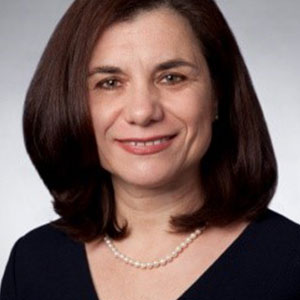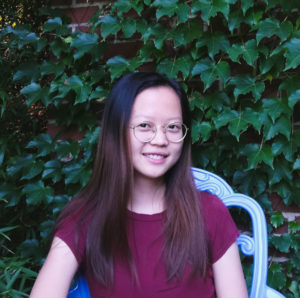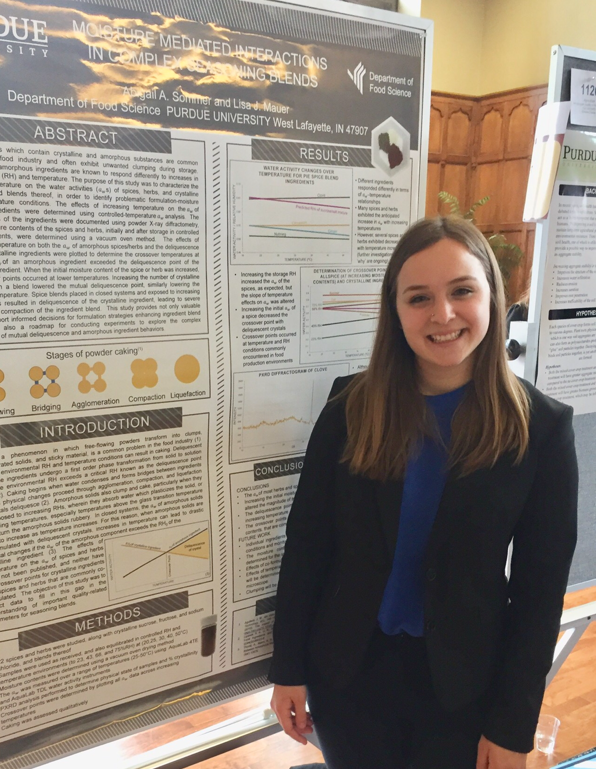By: Amanda Sia, Abbie Sommer and Mackenzie Hannum
Featured Image by Pickwriters
As a young girl in Greece, Maria Velissariou never imagined she would end up as Vice President for PepsiCo Nutrition R&D with responsibility for global grains, dairy and children’s platforms.
Maria grew up wanting to be a teacher and a scholar, because they seemed like people who can articulate their thoughts and make compelling cases, qualities that she greatly admired. Maria might not have become a teacher, but she is eloquent. Poised. Articulate. When we interviewed her, it was apparent the amount of thought she had put into her responses.

Maria Velissariou
Even as a young teenager, she never imagined herself as a working professional in the industry or in a business environment, because that was not something she was exposed to. She felt it was out of her reach. Therefore, Maria understands how exposure can inspire new possibilities, making her a fervent champion for exposing young people to as many role models and experiences as possible. It can open their horizons and help them discover themselves.
When she finished her high school studies, Maria made the decision that being a professional in the industry was something she wanted to conquer and decided to pursue her undergraduate degree in chemical engineering. She began her corporate career over 25 years ago, first at Dow Corning Europe as a process engineer and later on forayed into the food industry, starting with Kraft Foods before joining PepsiCo. Her breadth of industry experience and cross-functional expertise ranging from R&D, quality, procurement, manufacturing to management has allowed her to work with various stakeholders. Her technical training put her in R&D roles at the start of her career, but she actively sought out experiences in procurement & manufacturing, which she felt greatly added to her leadership and ability to do the job. Maria’s broad experience across various functions and roles would prove to be immensely helpful when she stepped into strategic leadership roles further down her career.

The path to gaining more experiences might look different depending on the company too:
“In a small company, sometimes you have to do all the tasks and wear all the hats. In a small company, you learn by necessity. In a big organization, it is a more organized development path. Big corporations have excellent programs that allow people to expand their expertise – it’s important for people to ask for those development opportunities and discover what resonates with them.”
People who gravitate towards the supply chain might need to acquire logistic skills. Those who gravitate towards management might want to build upon their leadership skills, both informally and formally.
“I have recently studied executive leadership at Cornell. I’ve been in leadership positions in all my career but I felt that it would be a cool thing to do – to actually formalize and update my skill set, because I think it is important for me at this point in my career.”
We asked Maria what other skills she thinks young food scientists should be equipped with to deal with the food challenges of the modern world. A key skill is an appreciation for the social sciences, such as economics and business, because the food profession is always dealing with people. Understanding the roles that various stakeholders play is crucial given the breadth and multidisciplinary nature of food science. In the same vein, familiarity with the upstream and downstream of food science, from an appreciation of agriculture to human physiology to environmental disposal, is also pivotal.
“Nowadays, food scientists are no longer just tasked with developing a better-tasting product, or a cheaper product, or a more nutritious product. We are being asked to do all of the above while making sure the product is environmentally sustainable and has lots of bioavailable nutrients, etc. We cannot be scholars of all, but we need to have an appreciation of the upstream and the downstream.”
Another skill Maria cites as being important is digital fluency. The digital transformation is setting a new pace for innovation and the food industry has to keep up with it. From precision agriculture to AI and robotics, to blockchain technology for better traceability, understanding how technological advances can be leveraged in the field of food is more important than ever. An IFT survey found that about 1/3 of students aspire to become food entrepreneurs. Maria wants to start the conversation regarding how we can incorporate aspects of teaching entrepreneurship and business in our curriculum. Are entrepreneurial skills and mindsets things that can be taught, or are they forged over years spent working in the corporate world?
Maria’s own corporate career spanned decades, beginning in the United Kingdom, where she did her graduate studies and worked for 17 years before settling in the United States, 15 years ago. Even though she has worked primarily in these two countries, her role involved supporting innovations and technologies all over the world, thus exposing her to a multitude of cultures and nationalities. When asked about her experience living and working in various countries and cultures, she said these transitions have been extremely formative and challenging, and ultimately helped give her a broader perspective and skills which she constantly uses in her new role at IFT. We were interested in what prompted this career transition – to move from the industry into her current role as Chief Science and Technology Officer at the Institute of Food Technologists (IFT), an international non-profit scientific society for professionals engaged in food science.

Photo by Henry & Co. from Pexels
Maria felt that food and environment are at a crossroads, and that moving into a position at IFT will enable her to drive collaboration and convene stakeholders, bringing them all into the conversation to define the priorities of food.
“IFT was the perfect place for me to really make a difference across the profession and sector, allowing me to work concurrently with academia, industry and the government. While working in industry, you tend to become an expert or more responsible in a defined area, whereas my role at IFT entails a much broader responsibility, allowing me to continually learn and challenge myself.”
In short, she stepped into her new role because of her desire to make a difference, her curiosity to learn and grow, to be at the helm of IFT and the intersection of science and policy, and lastly, to serve IFT’s members.
“It’s very important to expand the conversation, but it’s equally important to decide what you will focus on, and what is within your control, and drive for possible results.”
Want to know more? Stay tuned for the second part of the interview, where Maria Velissariou talks more about emerging issues in food and how different sectors can pool their strengths together to solve some of these issues.
 Amanda Sia | Linkedin
Amanda Sia | Linkedin
Amanda graduated with her M.S. in Food Science at The Ohio State University. Her research focuses on using vibrational spectroscopy data to build predictive models for use in quality assurance settings. Amanda received her B.S. in Food Science from University of Minnesota (a shocking change of environment since she is originally from Malaysia, a very tropical country). When she is not scanning peanuts in the lab, Amanda likes to play squash, sing in the shower (sorry housemates), watch sappy Korean dramas, and play the guitar.

Abbie Sommer | Linkedin | Website
After graduating with a B.S. in Food Science from Purdue University, Abbie decided to move one state over to pursue a Masters from Ohio State. Her research is focused on soy-based functional foods for use in clinical trials. When she’s not making thousands of soft pretzels (for science, of course), you can find her training for half marathons or experimenting in the kitchen. Recently, Abbie has developed a passion for sourdough and treats her starter like a child. She also has a recipe blog (Sommer Eats) as well as an Instagram account (sommer_eats), where she posts somewhat healthy but always delicious recipes.

Mackenzie Hannum | Linkedin
Mackenzie graduated with a B.S from The Ohio State University in Food Science and couldn’t get enough of it so decided to stay at Ohio State to pursue her PhD in Food Science with the focus on sensory science. Overall her research investigates panelist engagement and ways to improve sensory methodology. Fun fact about Mackenzie is that her 5th grade science fair project explained the concept of the 5 basic tastes so in a way she has come full circle. As much as she prides herself now on being a true foodie, ready to try all things sans olives, she will admit her two all-time, indisputable favorite foods are pretzels (any kind) and plain bagels. Truly…if she was stranded on a deserted island with only one food item it would be a tough battle between the two but pretzels would win out. Hard, soft, sourdough, sticks—you name it!







Leave a Reply